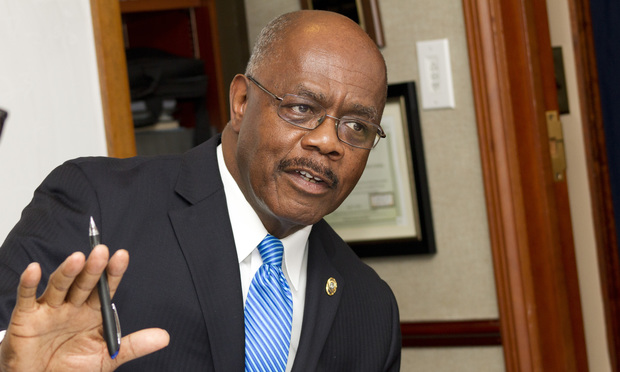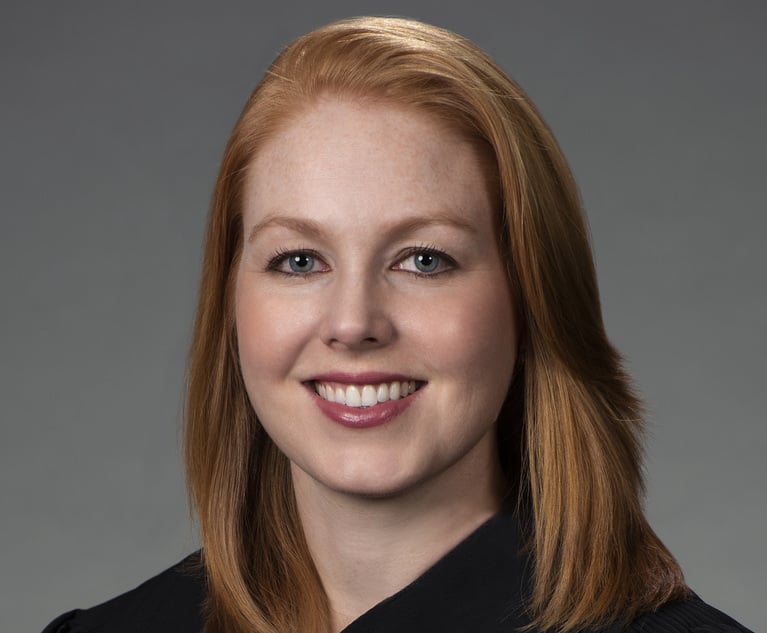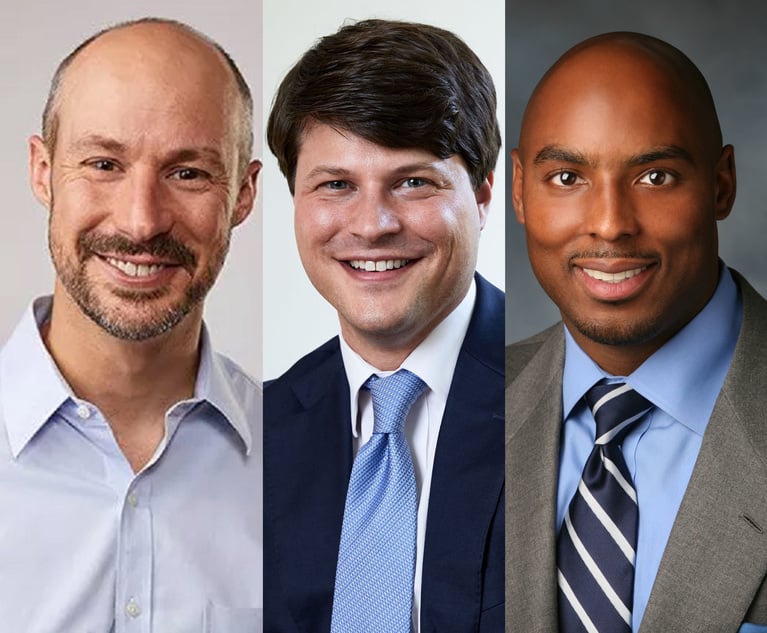'Legal Fiction': Former Prosecutors Criticize Paul Howard for Issuing Grand Jury Subpoena Without a Grand Jury
Grand juries have been suspended in Fulton County since March because of COVID-19, but that didn't stop Howard from issuing a grand jury subpoena involving an officer charged in the death of Rayshard Brooks.
July 08, 2020 at 05:07 PM
4 minute read
 Fulton County DA Paul Howard. Photo: John Disney/ALM
Fulton County DA Paul Howard. Photo: John Disney/ALM
Three former prosecutors say Fulton County District Attorney Paul Howard has issued an invalid grand jury subpoena for police records tied to a former officer charged with fatally shooting Rayshard Brooks.
Former DeKalb County District Attorney Jeff Brickman and former Cobb County DA Tom Charron said Howard's issuance of a grand jury subpoena without actually having a grand jury impaneled violates a state requirement that subpoenas be tied to a specific court date. No grand jury has been impaneled in Fulton County since March 13 because of the COVID-19 pandemic.
"You cannot issue a subpoena to a grand jury that does not exist," Brickman said. "It's a legal fiction, and it's improper. If I tried to issue a subpoena to a grand jury that simply doesn't exist, I would be laughed out of court."
"If you don't have a grand jury impaneled, that's a problem" and any subpoena issued without a grand jury would be null and void, said Charron, a former president of the National District Attorneys Association,
The sought-after documents are associated with an open internal "use of force" investigation into officer Garrett Rolfe, according to the subpoena. Rolfe shot Brooks in a fast-food parking lot in south Atlanta at the end of what began as a misdemeanor traffic stop on June 12.
Lawyers for the officers said the use of lethal force was warranted because Brooks resisted arrest, assaulted both officers, took one officer's Taser and then fired it at the other officer while trying to flee.
Former DeKalb County District Attorney J. Tom Morgan, now a criminal justice instructor at Western Carolina University, recalled that when he was DA, a young assistant unwittingly issued a grand jury document subpoena even though the county grand jury was not in session. DeKalb County Superior Court Judge Hilton Fuller held the young prosecutor in contempt, Morgan said. "We apologized profusely," he recalled. Fuller, he said, warned them "to never let it happen again."
On Tuesday, Howard said his office proactively sent grand jury subpoenas in advance of the expiration of a statewide judicial emergency order in the hopes that a grand jury might be able to convene.
The statewide judicial emergency order currently in place provides limited leeway for grand juries to convene, but only if they were already impaneled before March 14 or were recalled from a previous term while abiding by COVID-19 health directives. Fulton County had no grand jury empaneled when the statewide emergency took effect.
The current emergency order expires July 14 but Georgia Supreme Court Chief Justice Harold Melton announced at a meeting of the state Judicial Council this week that he will extend the current emergency order through Aug. 11.
Howard acknowledged that means he will not be able to impanel a grand jury for another month. He said when grand jury proceedings resume, his office "will resend the subpoenas at that time."
But the DA also questioned why he should have to issue a grand jury subpoena for police documents and evidence he deems "necessary in an investigation of one of their own employees."
When Howard announced multiple felony charges against Rolfe and fellow officer Devin Brosnan five days after Brooks was killed, the district attorney said a grand jury would not be impaneled until October at the earliest.
Rolfe faces charges of felony murder, aggravated assault, criminal damage to property, violating his oath of office, and failing to render medical aid. He is currently free on a $500,000 bond.
Brosnan, who is free on a $50,000 signature bond, also faces multiple felony charges, including aggravated assault, violating his oath of office, and failure to render medical aid.
Atlanta city attorney Nina Hickson declined to comment on the status of the subpoena.
But Rolfe defense counsel Noah Pines said issuing a grand jury subpoena when no grand jury is impaneled violates a state bar rule prohibiting records subpoenas "when there was no hearing, trial or deposition pending that would have supported the issuance of the subpoena." The maximum penalty for violating the rule is disbarment.
"The Georgia Supreme Court's rules and the law governing lawyers is clear," Pines said. "Lawyers cannot act like Paul Howard has acted in this case."
This content has been archived. It is available through our partners, LexisNexis® and Bloomberg Law.
To view this content, please continue to their sites.
Not a Lexis Subscriber?
Subscribe Now
Not a Bloomberg Law Subscriber?
Subscribe Now
NOT FOR REPRINT
© 2025 ALM Global, LLC, All Rights Reserved. Request academic re-use from www.copyright.com. All other uses, submit a request to [email protected]. For more information visit Asset & Logo Licensing.
You Might Like
View All
Justice Known for Asking 'Tough Questions' Resolves to Improve Civility
4 minute read

Alston & Bird Adds M&A, Private Equity Team From McDermott in New York
4 minute read
Veteran Federal Trade Law Enforcer Joins King & Spalding in Washington
4 minute readTrending Stories
- 1Pa. Superior Court: Sorority's Interview Notes Not Shielded From Discovery in Lawsuit Over Student's Death
- 2Kraken’s Chief Legal Officer Exits, Eyes Role in Trump Administration
- 3DOT Nominee Duffy Pledges Safety, Faster Infrastructure Spending in Confirmation Hearing
- 4'Younger and Invigorated Bench': Biden's Legacy in New Jersey Federal Court
- 5'Every Single Judge on Board': First-Impression Case Revived
Who Got The Work
J. Brugh Lower of Gibbons has entered an appearance for industrial equipment supplier Devco Corporation in a pending trademark infringement lawsuit. The suit, accusing the defendant of selling knock-off Graco products, was filed Dec. 18 in New Jersey District Court by Rivkin Radler on behalf of Graco Inc. and Graco Minnesota. The case, assigned to U.S. District Judge Zahid N. Quraishi, is 3:24-cv-11294, Graco Inc. et al v. Devco Corporation.
Who Got The Work
Rebecca Maller-Stein and Kent A. Yalowitz of Arnold & Porter Kaye Scholer have entered their appearances for Hanaco Venture Capital and its executives, Lior Prosor and David Frankel, in a pending securities lawsuit. The action, filed on Dec. 24 in New York Southern District Court by Zell, Aron & Co. on behalf of Goldeneye Advisors, accuses the defendants of negligently and fraudulently managing the plaintiff's $1 million investment. The case, assigned to U.S. District Judge Vernon S. Broderick, is 1:24-cv-09918, Goldeneye Advisors, LLC v. Hanaco Venture Capital, Ltd. et al.
Who Got The Work
Attorneys from A&O Shearman has stepped in as defense counsel for Toronto-Dominion Bank and other defendants in a pending securities class action. The suit, filed Dec. 11 in New York Southern District Court by Bleichmar Fonti & Auld, accuses the defendants of concealing the bank's 'pervasive' deficiencies in regards to its compliance with the Bank Secrecy Act and the quality of its anti-money laundering controls. The case, assigned to U.S. District Judge Arun Subramanian, is 1:24-cv-09445, Gonzalez v. The Toronto-Dominion Bank et al.
Who Got The Work
Crown Castle International, a Pennsylvania company providing shared communications infrastructure, has turned to Luke D. Wolf of Gordon Rees Scully Mansukhani to fend off a pending breach-of-contract lawsuit. The court action, filed Nov. 25 in Michigan Eastern District Court by Hooper Hathaway PC on behalf of The Town Residences LLC, accuses Crown Castle of failing to transfer approximately $30,000 in utility payments from T-Mobile in breach of a roof-top lease and assignment agreement. The case, assigned to U.S. District Judge Susan K. Declercq, is 2:24-cv-13131, The Town Residences LLC v. T-Mobile US, Inc. et al.
Who Got The Work
Wilfred P. Coronato and Daniel M. Schwartz of McCarter & English have stepped in as defense counsel to Electrolux Home Products Inc. in a pending product liability lawsuit. The court action, filed Nov. 26 in New York Eastern District Court by Poulos Lopiccolo PC and Nagel Rice LLP on behalf of David Stern, alleges that the defendant's refrigerators’ drawers and shelving repeatedly break and fall apart within months after purchase. The case, assigned to U.S. District Judge Joan M. Azrack, is 2:24-cv-08204, Stern v. Electrolux Home Products, Inc.
Featured Firms
Law Offices of Gary Martin Hays & Associates, P.C.
(470) 294-1674
Law Offices of Mark E. Salomone
(857) 444-6468
Smith & Hassler
(713) 739-1250






